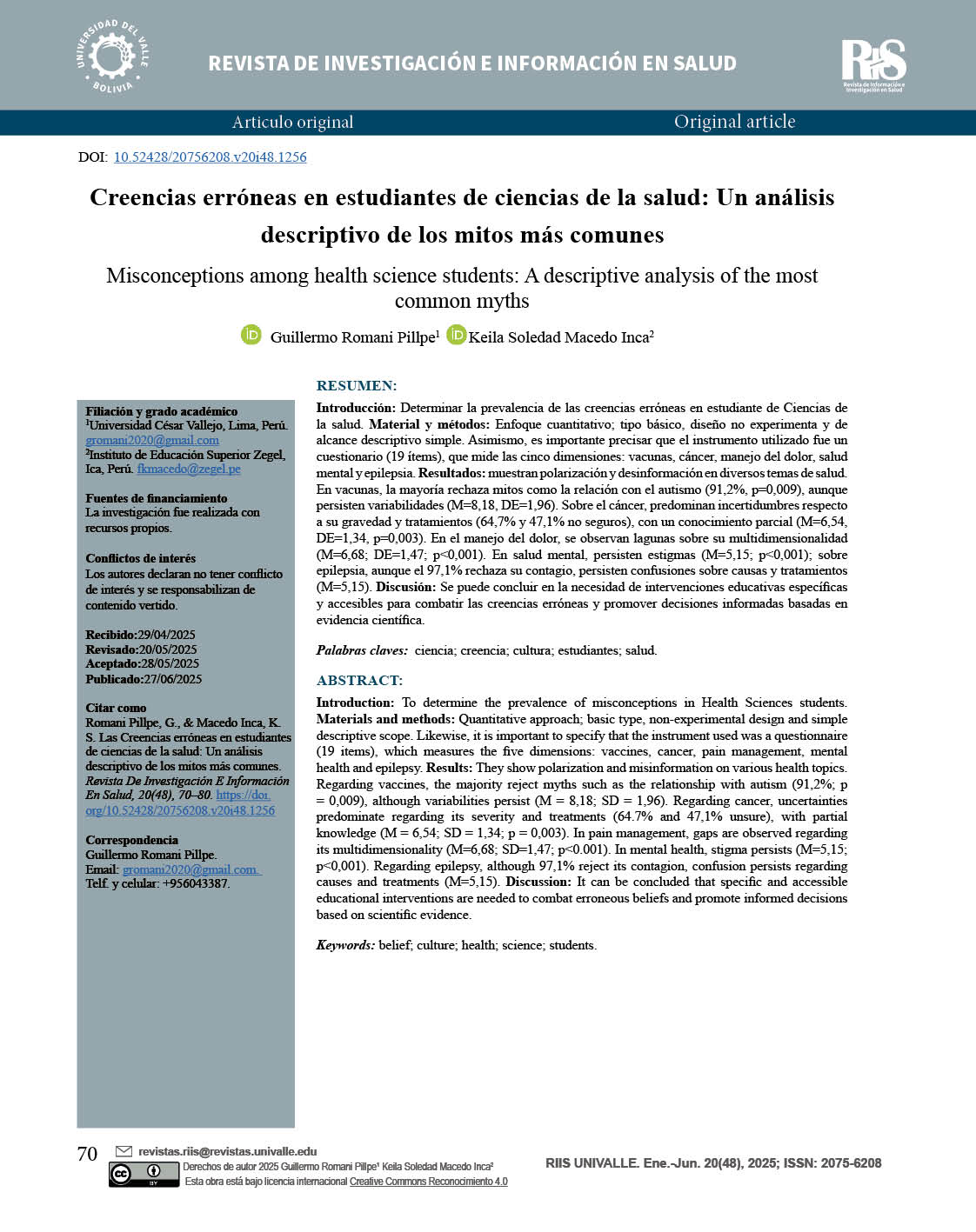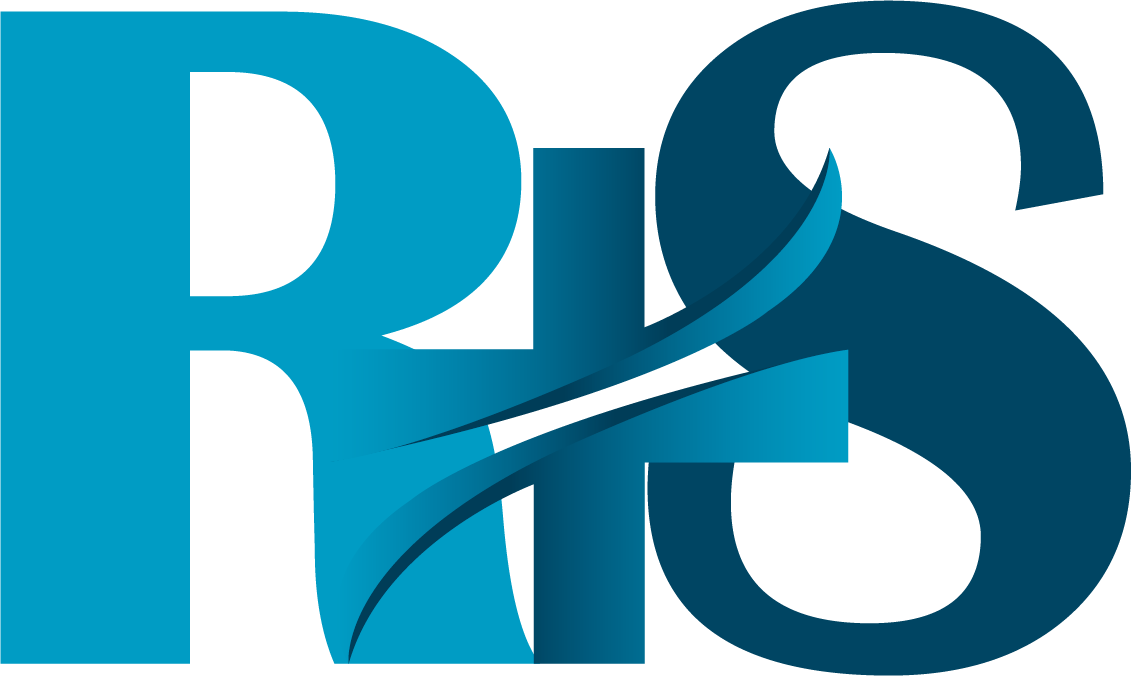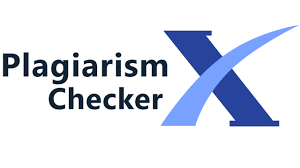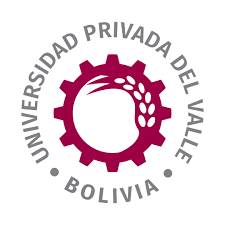Misconceptions among health science students: A descriptive analysis of the most common myths
DOI:
https://doi.org/10.52428/20756208.v20i48.1256Keywords:
: beliefs, health, myths, science, student, health, myths, sciencesAbstract
Introduction: To determine the prevalence of misconceptions in Health Sciences students. Materials and methods: Quantitative approach; basic type, non-experimental design and simple descriptive scope. Likewise, it is important to specify that the instrument used was a questionnaire (19 items), which measures the five dimensions: vaccines, cancer, pain management, mental health and epilepsy. Results: They show polarization and misinformation on various health topics. Regarding vaccines, the majority reject myths such as the relationship with autism (91,2%; p = 0,009), although variabilities persist (M = 8,18; SD = 1,96). Regarding cancer, uncertainties predominate regarding its severity and treatments (64.7% and 47,1% unsure), with partial knowledge (M = 6,54; SD = 1,34; p = 0,003). In pain management, gaps are observed regarding its multidimensionality (M=6,68; SD=1,47; p<0.001). In mental health, stigma persists (M=5,15; p<0,001). Regarding epilepsy, although 97,1% reject its contagion, confusion persists regarding causes and treatments (M=5,15). Discussion: It can be concluded that specific and accessible educational interventions are needed to combat erroneous beliefs and promote informed decisions based on scientific evidence.
Downloads
References
Badenhorst E, Mamede S, Hartman N, Schmidt HG. Exploring lecturers' views of first-year health science students' misconceptions in biomedical domains. Adv Health Sci Educ. [Internet] 2014;20(2):403-20. [consultado el 10 de noviembre de 2024]. doi: 10.1007/s10459-014-9530-8.
https://doi.org/10.1007/s10459-014-9530-8
PMid:25008246
Peng RX, Shen F. Why fall for misinformation? Role of information processing strategies, health consciousness, and overconfidence in health literacy. J Health Psychol. [Internet] 2024
https://doi.org/10.1177/13591053241273647
PMid:39175178
[consultado el 10 de noviembre de 2024]. doi: 10.1177/1359105324123456.
Badenhorst E, Mamede S, Hartman N, Schmidt HG. Exploring lecturers' views of first-year health science students' misconceptions in biomedical domains. Adv Health Sci Educ. 2014;20(2):403-20.
https://doi.org/10.1007/s10459-014-9535-3
PMid:25099944
Epstein WN. Nudging patient decision-making. Wash Law Rev. [Internet] 2017;92(3):1255-315. [consultado el 10 de noviembre de 2024]. Disponible en: https://www.google.com/search?q=https://heinonline.org/HOL/LandingPage%3Fhandle%3Dhein.journals/waslr92%26div%3D31%26id%3D%26page%3D
Poland GA, Jacobson RM. The clinician's guide to the anti-vaccinationists' galaxy. Hum Immunol. [Internet] 2012;73(8):859-66. [consultado el 10 de noviembre de 2024]. doi: 10.1016/j.humimm.2012.03.014.
https://doi.org/10.1016/j.humimm.2012.03.014
PMid:22504410
Chatterjee A, Okeefe C. Current controversies in the USA regarding vaccine safety. Expert Rev Vaccines. [Internet] 2010;9(5):497-502. [consultado el 10 de noviembre de 2024]. doi: 10.1586/erv.10.36.
https://doi.org/10.1586/erv.10.36
PMid:20450324
Morra CN, Adkins SJ, Barnes ME, Pirlo OJ, Fleming R, Convers BJ, et al. Non-STEM majors COVID-19 vaccine impressions improve, and misconceptions resolve, after podcast assignment. J Microbiol Biol Educ [Internet]. 29 de agosto de 2024 [consultado el 27 de diciembre de 2024];25(2). Disponible en: https://journals.asm.org/doi/10.1128/jmbe.00034-23
https://doi.org/10.1128/jmbe.00034-23
PMid:38874323 PMCid:PMC11360549
Kassianos G, Macdonald P, Aloysius I, Pather S. Responses to Common Misconceptions Relating to COVID-19 Variant-Adapted mRNA Vaccines. VACCINES. [Internet]enero de 2024;12(1):57. [consultado el 27 de diciembre de 2024]. https://doi.org/10.3390/vaccines12010057
https://doi.org/10.3390/vaccines12010057
PMid:38250870 PMCid:PMC10819631
Holford D, Schmid P, Fasce A, Lewandowsky S. The Empathetic Refutational Interview to Tackle Vaccine Misconceptions: Four Randomized Experiments. Health Psychol. [Internet] junio de 2024;43(6):426-37. [consultado el 27 de diciembre de 2024]. doi: 10.1037/hea0001290.
https://doi.org/10.1037/hea0001290
PMid:37227824 PMCid:PMC10674043
Biddle MA, Hopkins CS, Temples HS. Promoting Prevention: Improving Human Papilloma Virus Vaccination by Dispelling Misconceptions. JNP- J NURSE Pract. [Internet] octubre de 2024;20(9):105136. [consultado el 27 de diciembre de 2024]. doi: 10.1016/j.nurpra.2024.105136.
https://doi.org/10.1016/j.nurpra.2024.105136
Yang XL, Ma RCW, So WY, Kong APS, Xu G, Chan JCN. Addressing different biases in analysing drug use on cancer risk in diabetes in non-clinical trial settings-what, why and how? Diabetes Obes Metab. [Internet] 2012;14(7):579-85. [consultado el 27 de diciembre de 2024]. doi: 10.1111/j.1463-1326.2011.01551.x.
https://doi.org/10.1111/j.1463-1326.2011.01551.x
PMid:22171706
Golozar A, Liu S, Lin JA, Peairs K, Yeh HC. Does Metformin Reduce Cancer Risks? Methodologic Considerations. Curr Diab Rep. [Internet] 2016;16(1):1-11. [consultado el 27 de diciembre de 2024]. doi: 10.1007/s11892-015-0697-z.
https://doi.org/10.1007/s11892-015-0697-z
PMid:26733059
Petra P, Mária D, István S, András W, Péter N, Csaba P, et al. The pitfalls of lung cancer coding practices based on the evaluation of the National Cancer Registry. Magy Onkol. [Internet] 2024;68(2):115-23. [consultado el 27 de diciembre de 2024]. Disponible en: https://pubmed.ncbi.nlm.nih.gov/39013085/
LaFond CM, Van Hulle Vincent C, Oosterhouse K, Wilkie DJ. Nurses' Beliefs Regarding Pain in Critically Ill Children: A Mixed-Methods Study. J Pediatr Nurs. [Internet] 2016;31(6):691-700. [consultado el 27 de diciembre de 2024]. https://doi.org/10.1016/j.pedn.2016.08.002
https://doi.org/10.1016/j.pedn.2016.08.002
PMid:27600164 PMCid:PMC5124392
Kodagoda Gamage MW, Pu L, Todorovic M, Moyle W. Factors related to nurses' beliefs regarding pain assessment in people living with dementia. J Clin Nurs. [Internet] 2024;33(11):4367-80. [consultado el 27 de diciembre de 2024]. https://doi.org/10.1111/jocn.17093
https://doi.org/10.1111/jocn.17093
PMid:38459722
Dawson R, Sellers DE, Spross JA, Jablonski ES, Hoyer DR, Solomon MZ. Do patients' beliefs act as barriers to effective pain management behaviors and outcomes in patients with cancer-related or noncancer-related pain? Oncol Nurs Forum. [Internet] 2005;32(2):363-74. [consultado el 27 de diciembre de 2024]. https://doi.org/10.1188/05.onf.363-374
https://doi.org/10.1188/05.ONF.363-374
PMid:15759073
Garcia DM, De Mattos-Pimenta CA. Pain centers professionals' beliefs on non-cancer chronic pain. Arq Neuropsiquiatr. [Internet] 2008;66(2 A):221-8. [consultado el 27 de diciembre de 2024]. https://doi.org/10.1590/s0004-282x2008000200016
https://doi.org/10.1590/S0004-282X2008000200016
PMid:18545787
Rayan A, Fawaz M. Cultural misconceptions and public stigma against mental illness among Lebanese university students. Perspect Psychiatr Care. [Internet] 2018;54(2):258-65. [consultado el 27 de diciembre de 2024]. https://doi.org/10.1111/ppc.12232
https://doi.org/10.1111/ppc.12232
PMid:28726343
Usman Shah HB, Atif I, Nabeel M, Qureshi H, Sadiq SM, Ahmed W, et al. Perceptions About Treatment of Psychiatric Disorders By Faith Healers/ Psychiatrists Among General Public of Urban and Rural Areas Of Rawalpindi District. J Ayub Med Coll Abbottabad JAMC. [Internet] 2018;30(2):223-8. [consultado el 27 de diciembre de 2024]. Disponible en: https://pubmed.ncbi.nlm.nih.gov/29938423/
Lem WG, dos Santos Kawata KH, Kobayashi T, Oyama H. Public Stigma Related to People with Mental Health Conditions Among Japanese Company Employees. J Clin Med Res. [Internet] 2023;15(3):139-47. [consultado el 27 de diciembre de 2024]. Disponible en: https://pmc.ncbi.nlm.nih.gov/articles/PMC10079372/
https://doi.org/10.14740/jocmr4868
PMid:37035848 PMCid:PMC10079372
Shafiq M, Tanwir M, Tariq A, Saleem A, Zafar M, Khuwaja AK. Myths and fallacies about epilepsy among residents of a Karachi slum area. Trop Doct. [Internet] 2008;38(1):32-3. [consultado el 27 de diciembre de 2024]. https://doi.org/10.1258/td.2006.006311
https://doi.org/10.1258/td.2006.006311
PMid:18302862
Shibre T, Alem A, Tekle-Haimanot R, Medhin G, Tessema A, Jacobsson L. Community attitudes towards epilepsy in a rural Ethiopian setting: a re-visit after 15 years. Ethiop Med J. [Internet] 2008 ;46
(3) :251-9. [consultado el 27 de diciembre de 2024]. Disponible en: https://pubmed.ncbi.nlm.nih.gov/19271389/
Gedefa M, Wolde T, Solomon G. Knowledge, attitudes and practices with respect to epilepsy among preparatory school students in Mekelle City, Ethiopia. Int J Collab Res Intern Med Public Health. [Internet] 2012 ;4
(3) :203-15. [consultado el 27 de diciembre de 2024]. Disponible en: https://scispace.com/pdf/knowledge-attitudes-and-practices-with-respect-to-51nqd8yhsp.pdf
Braga P, Hosny H, Kakooza-Mwesige A, Rider F, Tripathi M, Guekht A. How to understand and address the cultural aspects and consequences of diagnosis of epilepsy, including stigma. Epileptic Disord. [Internet] 2020;22(5):531-47. [consultado el 27 de diciembre de 2024]. https://doi.org/10.1684/epd.2020.1201
https://doi.org/10.1684/epd.2020.1201
PMid:33079064
McCagh J. Epilepsy: Stereotypes, stigma and psychosocial consequences. En: Advances in Brain Research. [Internet] 2012. p. 71-83. [consultado el 27 de diciembre de 2024]. https://doi.org/10.1016/j.eplepsyres.2009.04.007
https://doi.org/10.1016/j.eplepsyres.2009.04.007
PMid:19616921
Willness CR, Boakye-Danquah J, Nichols Dr. How arnstein's ladder of citizen participation can enhance community-engaged teaching and learning. Acad Manag Learn Educ. [Internet] 2023;22(1):112-31. [consultado el 27 de diciembre de 2024]. Disponible en: https://journals.aom.org/doi/10.5465/amle.2020.0284
https://doi.org/10.5465/amle.2020.0284
Tonini S, Garofalo PG, Durisotti C, Marotti E. Knowledge, misconceptions and prejudices concerning epilepsy in a high school students sample. Boll - Lega Ital Contro Epilessia. [Internet] 2012;(144):110-8. [consultado el 27 de diciembre de 2024]. Disponible en: https://pmc.ncbi.nlm.nih.gov/articles/PMC10235557/
Prabhu AN, Venkatesh PD, Paul A, Pandey A, Mandal R, Madhusudhana K. Knowledge, attitude and practices regarding epilepsy among nurses in a tertiary care hospital in South India. Indian J Forensic Med Toxicol. [Internet] 2020;14(4):4172-9. [consultado el 27 de diciembre de 2024]. Disponible en: https://www.researchgate.net/publication/348295854_Knowledge_Attitude_and_Practices_Regarding_Epilepsy_among_Nurses_in_a_Tertiary_Care_Hospital_in_South_India
Yewnetu E, Mugumbate R, Tizazu EF, Zebenigus M, Woldemichael K. Health workers' perceptions of epilepsy and its treatment implications: A survey of nurses and other healthcare workers' in Addis Ababa, Ethiopia. Epilepsy Behav. [Internet] 2024;161. [consultado el 27 de diciembre de 2024]. https://doi.org/10.1016/j.yebeh.2024.110078
https://doi.org/10.1016/j.yebeh.2024.110078
PMid:39489996
Falavigna A, Teles AR, Roxo MRR, Velho MC, Da Silva RC, Mazzocchin T, et al. Awareness and attitudes on epilepsy among undergraduate health care students in southern Brazil. J Epilepsy Clin Neurophysiol. [Internet] 2009;15(1):19-23. [consultado el 27 de diciembre de 2024]. Disponible en: https://www.scielo.br/j/jecn/a/cnPWK6P8gKDbcv78KGrXRxh/?lang=en
https://doi.org/10.1590/S1676-26492009000100005
Mustafa MN, Wedaa Alla LG, Ahmad TK. Knowledge and attitude toward epilepsy among the final and semi-final years medical students at University of Bahri, Sudan. Epilepsia Open. [Internet] 2022;7(1):144-50. [consultado el 27 de diciembre de 2024]. https://doi.org/10.1002/epi4.12573
https://doi.org/10.1002/epi4.12573
PMid:34918489 PMCid:PMC8886093

Downloads
Published
How to Cite
Issue
Section
License
Copyright (c) 2025 Guillermo Romani Pillpe, Keila Macedo

This work is licensed under a Creative Commons Attribution 4.0 International License.
Authors who publish with this journal agree to the following terms:
- Authors retain copyright and grant the journal right of first publication with the work simultaneously licensed under a Creative Commons Attribution License 4.0 that allows others to share the work with an acknowledgement of the work's authorship and initial publication in this journal.
- Authors are able to enter into separate, additional contractual arrangements for the non-exclusive distribution of the journal's published version of the work (e.g., post it to an institutional repository or publish it in a book), with an acknowledgement of its initial publication in this journal.
- Authors are permitted and encouraged to post their work online (e.g., in institutional repositories or on their website) prior to and during the submission process, as it can lead to productive exchanges, as well as earlier and greater citation of published work.






















